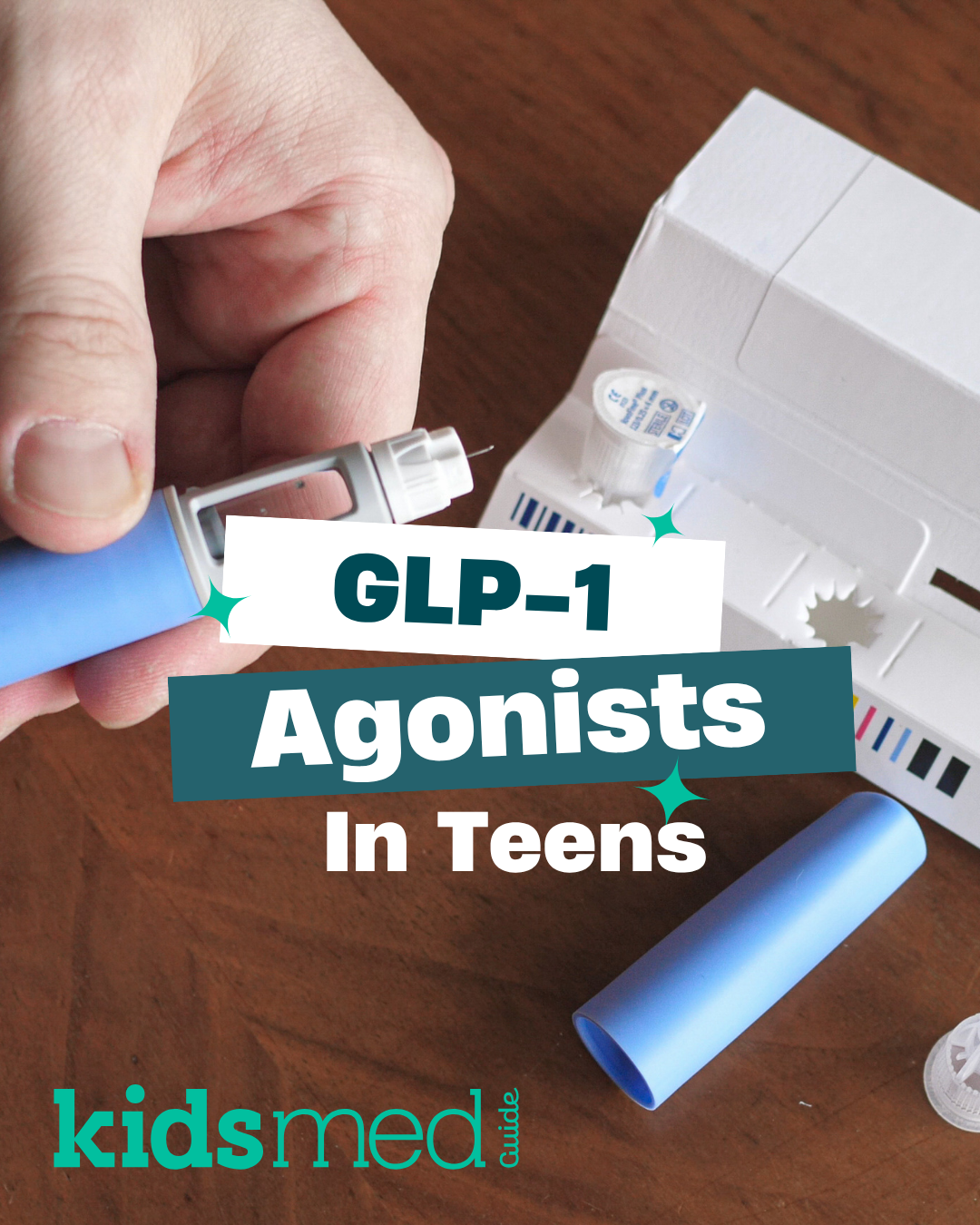Ozempic and Adolescents: What Parents Should Know About Weight Loss Meds

Ozempic® has gained widespread attention. Commercials, celebrity interviews, memes, and TikTok weight loss stories fill social media feeds. We all know someone (maybe even ourselves!) who has seen benefits from Ozempic or other GLP-1 agonists.
Ozempic is FDA-approved for adults with type 2 diabetes, but it also aids in weight management and is often prescribed “off-label” for obese or overweight adults. Ozempic currently has no approved uses for pediatric patients.
However, Wegovy® (which contains the same active ingredient, semaglutide) and Saxenda® (which contains liraglutide, another active ingredient in the GLP-1 agonist class) are FDA-approved for weight management in some adolescents with obesity.
What Are Ozempic & Wegovy (Semaglutide)?
Ozempic is a brand of semaglutide, a medication that mimics a hormone called GLP-1. It helps regulate blood sugar, slows digestion, and promotes a feeling of fullness. It was first approved to treat type 2 diabetes, but has also been shown to help with significant weight loss.
Ozempic was the first GLP-1 agonist in its class to gain widespread attention for weight loss benefits. Other semaglutide products are now available. Wegovy is a higher dose of semaglutide, approved specifically for weight management. Saxenda (liraglutide) is also approved for weight management in teens.
What’s Approved for Teens?
- Wegovy (semaglutide) and Saxenda (liraglutide) are FDA-approved for adolescents ages 12 and older with obesity
- Used along with a reduced-calorie diet and increased physical activity
- Ozempic itself is not FDA-approved for weight loss in teens, but may be prescribed off-label by qualified pediatric endocrinologists
How Does It Work?
Semaglutide is administered as a weekly injection. It mimics a natural hormone called GLP-1 that helps to:
- Reduce appetite by acting on the brain to send satiety ("I'm full") signals
- Slow stomach emptying
- Regulate glucose by stimulating insulin release and suppressing glucagon
- Support steady, medically supervised weight loss
GLP-1 agonists may also aid in increased calorie burning and offer some cardiovascular benefits, although these effects are still being investigated.
Liraglutide has the same mechanism of action, but it is administered once daily.
Is It Safe for Teens?
Clinical trials in adolescents have yielded promising results, including weight loss and improvements in metabolic markers. Common side effects include:
- Nausea, vomiting, or diarrhea
- Constipation
- Fatigue
- Low blood sugar
- Rarely, gallbladder problems, pancreatitis, kidney problems, and other serious adverse effects may occur. Always read the full package insert and discuss concerns and monitoring with your child’s physician.
The long-term effects in teens are still being studied, and use should be closely monitored by a pediatric specialist. Parents need to carefully consider the risks and benefits of obesity and GLP-1 agonists when deciding for their teen.
The American Academy of Pediatrics recommends that providers consider the use of GLP-1 agonists in treating obesity in teenagers, in conjunction with lifestyle modifications, counseling, and other supportive measures.
Wegovy, Ozempic, and other weight-loss medications should ONLY be prescribed by a pediatric specialist and filled by a licensed pharmacy. Do not use med spas, online retailers, or other services. Your teen should have an established relationship with their provider to ensure that proper prescribing and monitoring occur.
What Parents Should Consider
- This isn’t a first-line treatment. Lifestyle changes should come first and must be maintained during medication use and as a lifelong habit.
- It’s not intended for cosmetic weight loss; it’s for medical obesity.
- Ongoing support is essential: nutrition, mental health, and physical activity all play a role, and a multifaceted approach is most effective.
- Stopping the medication may result in weight regain if no long-term support strategies are in place.
The Bottom Line
Semaglutide could be a breakthrough for some teens dealing with obesity-related health problems. It also carries the risk of significant side effects. Parents should consult a pediatric endocrinologist or an obesity specialist to determine if it’s appropriate and to learn how to use it safely as part of a broader treatment plan.
GLP-1 agonists are relatively new medications, and long-term safety studies are still ongoing. The long-term effects on adolescents and young people are not yet known. However, obesity in adolescents also has serious, lifelong health consequences. Parents, patients, and healthcare teams must collaborate to assess the risks and benefits of GLP-1 agonists in adolescents.
The following references were used to compile this information:
Hampl, S. E., Hassink, S. G., Skinner, A. C., Armstrong, S. C., Barlow, S. E., Bolling, C. F., Avila Edwards, K. C., Eneli, I., Hamre, R., Joseph, M. M., Lunsford, D., Mendonca, E., Michalsky, M. P., Mirza, N., Ochoa, E. R., Jr, Sharifi, M., Staiano, A. E., Weedn, A. E., Flinn, S. K., … Okechukwu, K. (2023). Clinical Practice Guideline for the Evaluation and Treatment of Children and Adolescents With Obesity. Pediatrics, 151(2), e2022060640. https://doi.org/10.1542/peds.2022-060640
Ozempic® (semaglutide) injection for Type 2 Diabetes. (n.d.). Retrieved July 15, 2025, from https://www.ozempic.com/
Prescription Weight-Loss Medicine | Saxenda® (liraglutide) injection 3mg. (n.d.). Retrieved July 15, 2025, from https://www.saxenda.com/
Treatment for Obesity in Children & Teens. (2011, December 12). HealthyChildren.Org. https://www.healthychildren.org/English/health-issues/conditions/obesity/Pages/Weight-Loss-Programs.aspx
Weight Loss and Cardiovascular Risk Treatment | Wegovy (semaglutide). (n.d.). novoMEDLINK. Retrieved July 15, 2025, from https://www.novomedlink.com/obesity/products/treatments/wegovy.html

